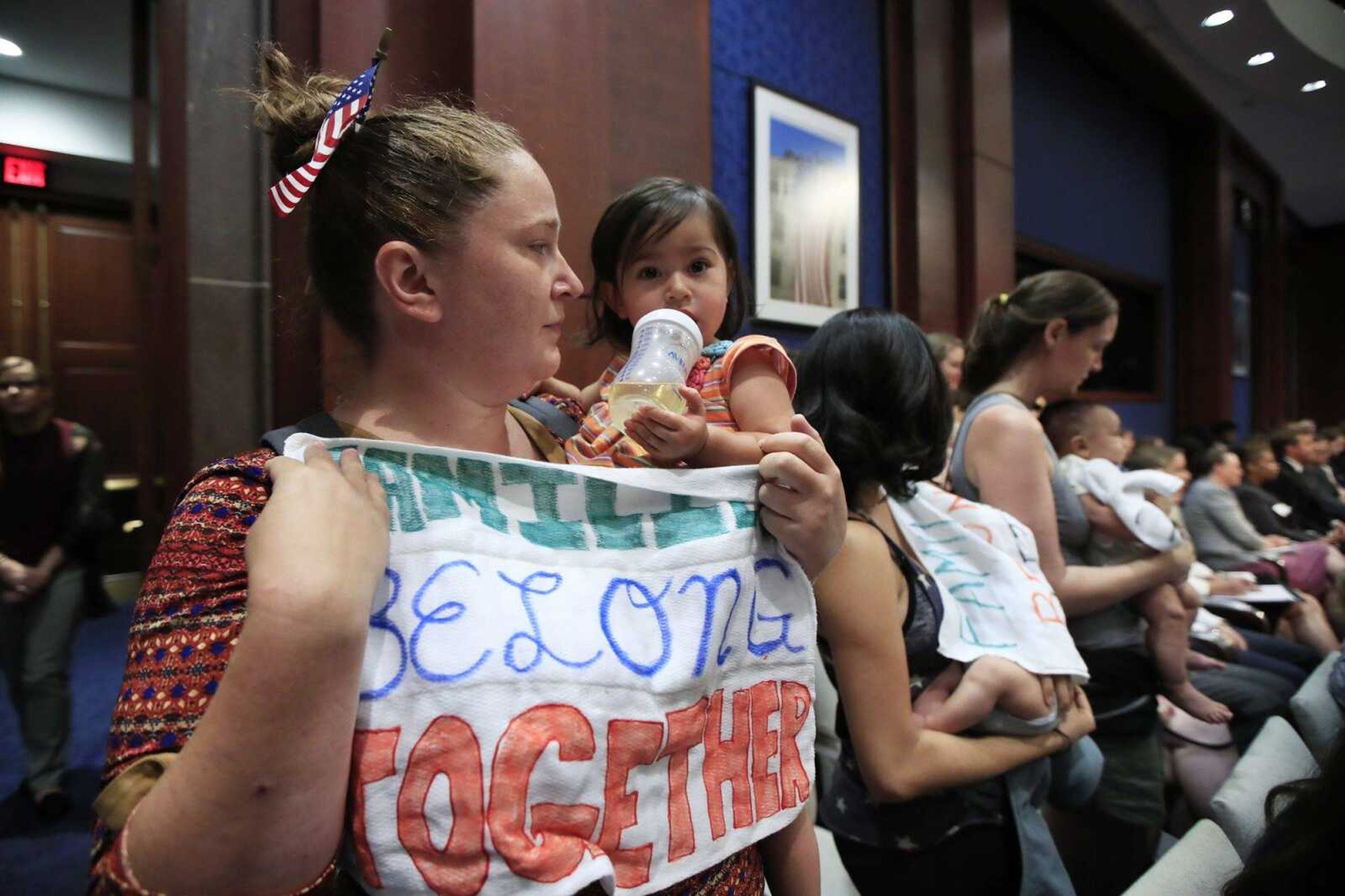House struggles to unite behind bills to deal with border crisis
WASHINGTON -- Speaker Paul Ryan is pushing ahead with votes on rival House GOP immigration bills, but neither appears to have enough support for passage, prompting President Donald Trump to take executive action Wednesday to stem the crisis of family separations at the border...
WASHINGTON -- Speaker Paul Ryan is pushing ahead with votes on rival House GOP immigration bills, but neither appears to have enough support for passage, prompting President Donald Trump to take executive action Wednesday to stem the crisis of family separations at the border.
Trump has said he's "1,000 percent" behind both GOP bills, but restive House Republicans have all but begged GOP leaders for more clarity about what the president would actually sign. Public outcry is mounting over the family separations, but so far, there's no clear roadmap for voting today on the emotional issue dividing Republicans.
With the immigration bills teetering in the House, the White House launched an eleventh-hour push to try to bring Republicans onboard.
Ryan took a group of wavering lawmakers to the White House to meet with Trump in hopes he could persuade them. Back on Capitol Hill, Attorney General Jeff Sessions and Homeland Security Secretary Kirstjen Nielsen also met with House Republicans.
The results were mixed, with some lawmakers newly announcing their support for a compromise bill, but others digging in against it. With congressional outcome uncertain -- and facing condemnation of the family separations from across the political spectrum -- the White House took action.
Trump signed an executive order directing Nielsen's department to keep families together after they are detained crossing the border illegally.
"We're going to have strong, very strong borders, but we're going to keep the families together," said Trump, who added he didn't like the "sight" or "feeling" of children separated from their parents.
More than 2,300 children were separated from their families at the border from May 5 through June 9, according to DHS.
Under the administration's policy, all unlawful crossings are referred for prosecution -- a process moving adults to the custody of the U.S. Marshals Service and sending many children to facilities run by the Department of Health and Human Services. Under the Obama administration, such families were usually referred for civil deportation proceedings, not requiring separation.
But on Capitol Hill, executive action is not the same as a legislative fix. Senate Republicans introduced their own bill to halt the family separations by allowing families to be held indefinitely in custody. Senators worried Trump's fix would not stand up in court and were eager to go on record in opposition to the practice of separating families.
Meanwhile, House Republicans were pushing forward with votes today on their broader immigration overhaul.
Ryan told reporters he prefers to see parents and children detained together in custody, as the GOP bills would codify into law.
"We do not want children taken away from their parents," he said.
As Republicans met privately Wednesday to discuss their legislation, House Democrats brought about two dozen immigrant children to the chamber floor in an unusual morning protest defying House rules as they condemned the separation of families at the border.
Democrats said the images of children being held in cages in border facilities, some crying for their parents, would be a moment remembered in U.S. history. Rep. Luis Gutierrez, D-Ill., said Americans were "standing up for children, standing up for those who are in need."
As Gutierrez spoke, his microphone was cut off because the gathering in the chamber was considered a breach of decorum. Presiding Rep. Liz Cheney, R-Wyo., gaveled the House to order.
GOP lawmakers, increasingly fearful of voter backlash in November, want to move away from the immigration issue, but passage of any bill today remains uncertain.
Many Republicans in the House have sought more clarity from Trump before giving their backing to the broader immigration bills, which also offer different remedies for other provisions on protecting "Dreamer" immigrants from deportation and funding for Trump's border wall.
"Some of the members wanted to make sure the president is very visible in his support for both bills," said Rep. Mark Walker, R-N.C., the chairman of the conservative Republican Study Committee, which makes up more than half the GOP majority.
Walker said several lawmakers remained undecided, denying leadership of the majority needed for passage. They want to see Trump's support "constantly as we move forward -- that he's out there vocally supporting what he believes is the best pathway forward," Walker said.
Even if Republicans manage to pass one of the immigration bills through the House, it is all but certain to fizzle in the Senate, where Republicans are rallying behind a different approach.
Theirs is narrow legislation proposed by Sen. Ted Cruz, R-Texas, and others to allow detained families to stay together in custody while expediting their hearings and possible deportation proceedings.
Under the bill, children under age 18 would be kept with their families in residential centers during legal proceedings. Facilities would have to be "secure and safe." Children would be separated from adults who are not their parent or who have serious criminal records, or if there is evidence of abuse or trafficking.
The government would prioritize processing such families and add 1,000 beds and 225 immigration judges.
"The question is, Do congressional Democrats want to actually solve the problem or do they want an issue to campaign on in November?" Cruz said.
Senate Democrats have rallied behind a bill from Sen. Dianne Feinstein, D-Calif., that would prohibit migrant families from being separated. Feinstein and Cruz have been in talks about a possible compromise.
Connect with the Southeast Missourian Newsroom:
For corrections to this story or other insights for the editor, click here. To submit a letter to the editor, click here. To learn about the Southeast Missourian’s AI Policy, click here.









